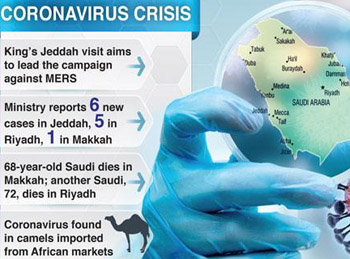 Jeddah, Apr 25: Saudi authorities reported 12 new MERS cases on Thursday, including two fatalities, as Acting Health Minister Adel Fakeih appointed Dr. Tariq Ahmed Madani of King Abdulaziz University Hospital as his new medical adviser to combat the deadly diseases.
Jeddah, Apr 25: Saudi authorities reported 12 new MERS cases on Thursday, including two fatalities, as Acting Health Minister Adel Fakeih appointed Dr. Tariq Ahmed Madani of King Abdulaziz University Hospital as his new medical adviser to combat the deadly diseases.
Fakeih, who is also the Labor Minister, also ordered the transfer of coronavirus cases to King Saud Hospital in north Jeddah.
According to the Health Ministry, Jeddah has recorded the largest number of infections (6) by the deadly coronavirus followed by Riyadh (five) and Makkah (one). A 68-year-old Saudi man died in Makkah, said the ministry statement. The other fatality, a 72-year-old Saudi woman, was in Riyadh.
Of the new infection cases in Jeddah, a 51-year-old Syrian doctor is in the ICU of King Fahd Hospital and a 28-year-old Indonesian woman is in King Saud Hospital. Other Jeddah cases were: Two Palestinians, an Egyptian and a Saudi national.
The cases in Riyadh include a 40-year-old Filipino nurse in addition to four Saudi nationals. A 34-year-old Filipino nurse, who was working at the ICU of Al-Noor Hospital in Makkah, is the only infection case in the holy city.
Officials are struggling to alleviate concerns that the virus is spreading amid a spike in infections over the past several weeks.
National Guard Minister Prince Miteb bin Abdullah said Custodian of the Two Holy Mosques King Abdullah advanced his visit to Jeddah to lead the campaign against the disease.
Speaking about the king’s concern toward his citizens, Prince Miteb said: “When the rift valley fever hit Jazan, King Abdullah cut short his visit to France and flew to Jazan to oversee the efforts to fight the disease.”
Minister Fakeih has set up two committees in the last 24 hours to consider the request of King Saud Hospital not to receive cases due to lack of isolation rooms, lack of enough medical and nursing staff to deal with number of these cases, as well as a shortage of beds at the hospital.
The hospital has 85 beds, including 25 in intensive care and 15 for deportation cases, leaving only 45 beds to accommodate other cases received by the hospital, such as tuberculosis, AIDS, dengue fever, and others.
Following reports of coronavirus found in camels from African markets, Saudi businessmen said they are exploring possibility of importing livestock from non-African sources.
Jeddah businessmen have urged Uruguay Foreign Minister Luis Almagro to sign an agreement with the Saudi Agricultural Ministry for the import of livestock and frozen meat directly to the Kingdom.
Fahd Al-Sulami, a member of the Jeddah Chamber of Commerce and Industry, said livestock traders have expressed their desire to diversify import sources in order to avoid disease-carrying cattle.





Comments
Add new comment